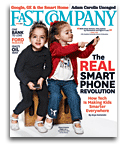 The Emerging Technology Disaster
The Emerging Technology Disaster
in Early Childhood Education
On Fast Companies’ Article – A is for App
See: http://www.fastcompany.com/magazine/144
To the Editor of Fast Company, Anya Kamenetz, the author, and Paul Kim, CTO, Stanford University School of Education, quoted on the cover.
Just look at Eliana and Germma Singer on the cover, both age three – so cool, so hip, learning their ABCs on the iPhone – the next Technopolitan cover girls. Next to them bold – red “The Real Smart Phone Revolution, How Tech Is Making Kids Smarter Everywhere.”
Sirs and madam, technology cannot and does not make kids smarter. Nothing can be further from the truth. Intelligence is innate, not learned or accumulated, and universally present in every cell of the body and all of nature. To suggest that an iPhone will improve this vast innate intelligence is dehumanizing. How dare you? 1, 2
Rather, technology is causing the human brain and everything attached to it to become more like the technology it is interacting with – more conditioned and mechanical, especially when this brain-machine-intercourse is encouraged, as your cover story does so well, early in the development sequence. 3, 4, 5
The field of epigenetics, now well established, is based on the fact that genetic expression is triggered by the environment. Human beings have altered the world and their brain-behavior-development is being sculpted by those changes – from the inside out. Change the environment and you change the brain that interacts with that environment. The two, brain and environment, are inseparable, two sides of a single coin. The weaver becomes the web. 6, 7
In the 1950s television was rolled out and marketed as the next ‘revolution’ in education. It did not happen. In fact, study after study links prolonged exposure to television to a long list of personal, social, educational and health ills. Next we were SOLD on the idea that computers in every classroom would revolutionize education.
Then it was the internet. Now it is personalized iPods and Palm Pilots, crammed full of video games disguised as so called ‘educational’ applications – branded with headlines – How Technology Could Unleash Childhood Creativity – and Transform the Role of the Teacher. How dare you? 8, 9, 10, 11, 12
Your article, a facsimile of countless before, refers to our beloved Sesame Street. After millions of public funds invested in this so called early literacy TV hype, not one study of which I am aware confirms that Sesame Street improved literacy. On the contrary a number of studies demonstrate that children who watched this TV bonanza the most had the lowest literacy scores. The same can be said for the more recent hybrid Baby Einstein. A class action suit was filed against this exploitive corporate baloney for false and misleading advertising. 13
The Campaign for a Commercial-Free Childhood (“CCFC”) asks the Federal Trade Commission to bring an action against Baby Einstein and Brainy Baby for engaging in deceptive acts and practices in violation of Section 5 of the Federal Trade Commission Act.
The American Academy of Pediatrics (“AAP”) recommends “no screen time” for children under age two, including television or videos promoted for that age group. Despite this recommendation, companies have aggressively marketed videos for children under two, making over one billion dollars from the sales of these videos. Companies such as Baby Einstein and Brainy Baby have capitalized on parents’ desires to give their very young children a leg up on learning and development by deceptively and falsely marketing their videos as educational and beneficial for infant development. 14